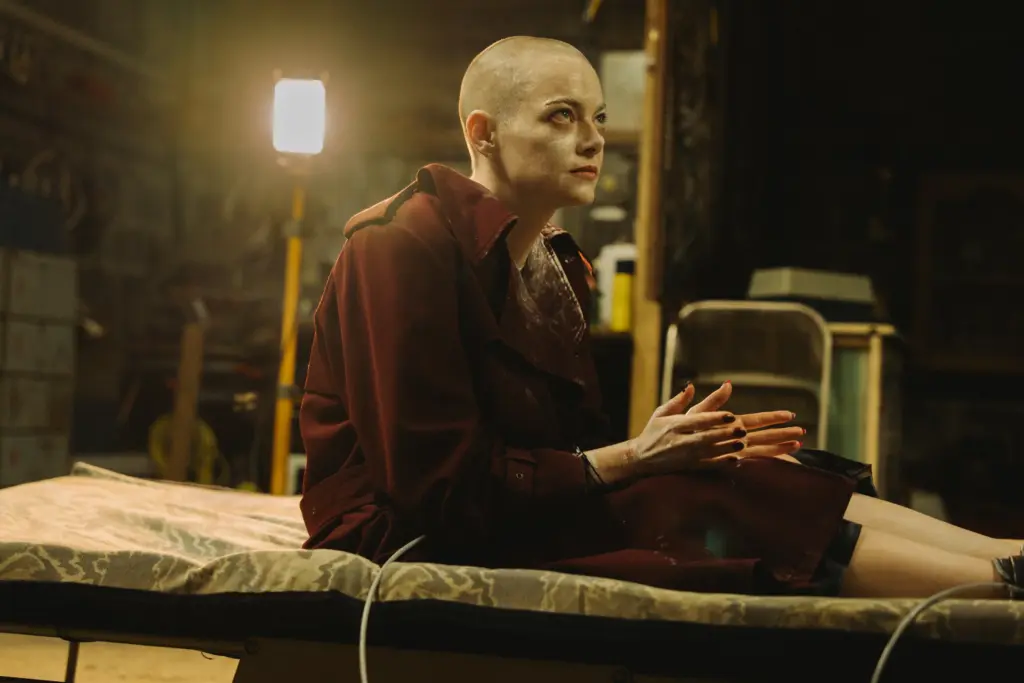Dark comedy meets humanity’s collapse in ‘Bugonia’
Dark comedy meets humanity’s collapse in ‘Bugonia’
Review: Director Yorgos Lanthimos’ newest film provides raw insight into human cruelty, societal collapse and feelings of alienation.

As the credits rolled, silence filled the theater at Regal Destiny USA, the only sound being of crinkling wrappers and zipping coats. It was safe to say that the Greek director Yorgos Lanthimos’ newest film Bugonia made people squirm in their seats and possibly consider one question: is humanity doomed?
Serving as a remake of the 2003 South Korean film Save the Green Planet!, the movie follows Jesse Plemons’ character Teddy, a paranoid beekeeper who lives with his cousin Don, played by breakthrough actor Aidan Delbis. Teddy believes that the CEO of the company he works for is actually part of an alien species called the Andromedans.
The CEO, Michelle (played by Oscar-winning actress Emma Stone), is then kidnapped by Teddy and Don, who plan on using Michelle as a bargaining tool to get in contact with the Andromedan emperor and save Earth.
Sporting a freshly-shaved head and lathered in antihistamine cream, Michelle endures days filled with torture and psychological games. Each conversation between Teddy and Michelle blurs the line between paranoia and the truth, leaving the audience to wonder who is being honest.
Bugonia serves as an essential critique of capitalistic society, one in which underpaid and overworked employees are exploited by higher-ups.
The film opens with images of bees, and, throughout the movie, the symbol of bees is explored when Teddy discusses how Michelle’s pharmaceutical company is allegedly killing the insects. Teddy sees himself as a bee, constantly working for the queen, Michelle.
Teddy’s dark past is explored, including a dive into how his mother was a test subject for one of the pharmaceutical company’s drugs and fell into a coma. Teddy was also abused by a former babysitter who is now a cop looking into Michelle’s disappearance. These incidents contribute to Teddy’s anger and give the audience insight into his motive.
Bugonia wastes no time grounding itself as an intense battle for power between characters. The film leaves just enough space to let the audience try and reach their own conclusions before the finale. It delivers the right balance of psychological insight into both Teddy and Michelle, making them both seem like real people. At times, Teddy even seems logical, and at others, Michelle seems to be messing with him.
The concept of greed is explored through Bugonia’s more satirical moments, but Lanthimos always pauses the action to let the audience think. He perfectly balances the film’s focus: on one side is a possible conspiracy theorist who suffers from delusions, and on the other is an out-of-touch CEO who could possibly be serving an alien species.
The film makes sure to highlight the fact that Michelle is a bad person, even if she isn’t an alien. Her drug company hurts both humans and the environment while she continues to profit and live an extravagant lifestyle.
Stone excels in her role as a cold leader entirely consumed by status, while Plemons intensifies the screen as a distressed individual fighting to be heard. Both of these characters are frustrating in their own ways, but work together to make this film hard to look away from.
The film’s final shots highlight late-stage capitalism, such as mass production warehouses, businessmen in meetings, children living among rubble and rich people relaxing on boats. Turns out, Teddy represented working class frustration that is often ignored and exploited.
Though its ending might seem bleak to some, Bugonia sparks a discussion around how humans treat both this planet and each other. This film is a reminder of the current climate catastrophe and the greed-ridden governments that are fueling it every single day. It certainly reminds the audience that we are responsible for fixing the mess that we have made.
